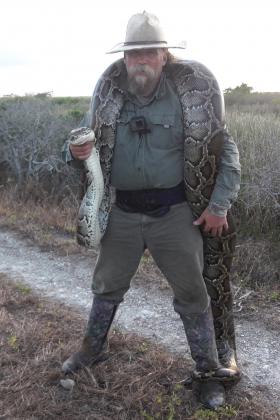by Larry
January, 2018Vets Fight PTSD Hunting PythonsCalling themselves "Swamp Apes," a collection of mostly U.S. military vets in FL are combating stress bagging Burmese pythons, over 500 of them so far. Veterans often have trouble adjusting after foreign engagements. The python eradication program offers a combination of adrenaline rush, a sense of mission, group cohesion, and danger similar to typical war zone experiences overseas, aiding in soldiers' transitions back to civilian life. Swamp Apes was founded by Thomas Rahill, not a veteran himself, who has taken on a dual task, to aid the FL ecology by removing the pythons from the Everglades and similar, nearby environments while also giving veteran volunteers a chance for therapy. Performing useful service in this way helps them channel and work through the energy, stress, or grief leftover from combat commitments. Known for its previously dominant native alligator species, the vast Everglades is being taken over by large numbers of the pythons, thought to have been introduced into FL wetlands around the 1980s, when pet owners grew tired of keeping the reptiles themselves. The problem was significantly worsened in 1992 when Hurricane Andrew destroyed a breeding facility, releasing many young Burmese pythons into the national park. The area ecology has proven ideal for this destructive species, so much so that alligators are declining there even as the constrictor snakes are spreading to surrounding territories. Burmese pythons can reach 23 feet in length, eat more or less everything the alligators do plus the alligators themselves, can also reproduce faster than the local Crocodilians, and are devastating the one-of-a-kind watery settings in southwest FL. An estimated 100,000 of the pythons are alive in FL today. The rise in their numbers coincides not only with a decline in alligators but a 99% loss of area raccoon and opossum numbers plus an 88% decrease in bobcats.
FL officials have been trying multiple means to control the large snakes, including employing machete wielding snake hunter tribesmen from India. Now the Swamp Apes are taking their turn at the cause. These veterans do not go after only the Burmese pythons but help control a variety of invasive plants and animals in FL. Still, with several hundred bagged and mostly euthanized Burmese pythons under their collective belt, the Swamp Apes are making a needed contribution to this particular effort at managing unwanted species. Work in the challenging Everglades environment distracts Swamp Apes from dark obsessions. Thomas Rahill says combat vets have nightmares or flashbacks from wartime. Yet in the small groups of five or so volunteers that he leads into the Everglades each week for shifts lasting six, seven, even twelve hours, the snake hunters work through and often go beyond their PTSD symptoms. Rahill also was dealing with deep emotions when he took on this preservation work. Out of financial necessity, his wife took a distant job in 2008. Their being apart was highly upsetting for him. A telecommunications administrator, he added volunteer hours, making trails and snake hunting, and found these activities took his mind off his negativity. Two relatives who were veterans gave him the idea to employ vets in such work. It gave him an added sense of purpose to combine the ecological support mission with assisting others in coping with the skeletons in their closets. The endeavor has been successful for Rahill, his vet volunteers, and the FL ecology. The Swamp Apes have cooperated with the University of South FL in researching the joint benefits of their wilderness enhancing and PTSD therapy program, the findings due to be presented to the American Public Health Association. They hope their model can be exported to other venues and parts of the U.S. having similar conjunctions of dangerous environmental threats with folks wanting to exorcise their collective demons. Indeed, looking at FL alone, much more could be done, both in terms of the need for help with PTSD and the challenges of species harmful to native ecology. It is clear that, for all the good they have done so far, the Swamp Ape's removal of about 500 Burmese pythons from the Everglades is but 0.5% of the need. And there are still in that state aggressive troupes of rhesus macaques (that have taken over areas of one of its more popular parks) plus 500,000 feral hogs yet to be dealt with. Nationwide, the latter are said to number in the millions, doing billions in environmental and agricultural damage. Nor are difficulties related to PTSD going away soon. Primary sources: Python Patrol: Group of Mostly Military Veterans Hunts Snakes to Help Combat Stress. Ken Kaye in www.sun-sentinel.com; June 15, 2015; Florida Veterans Fight a New Enemy: Invasive Snakes in the Everglades. in wunc.org [North Carolina Public Radio]; November 13, 2017. |
